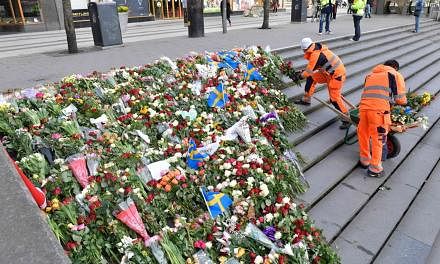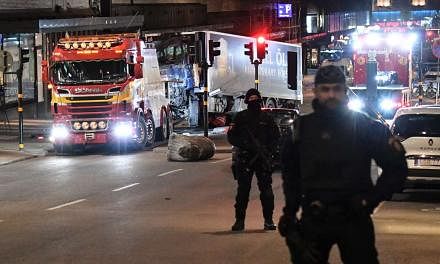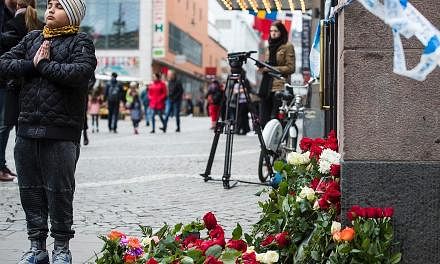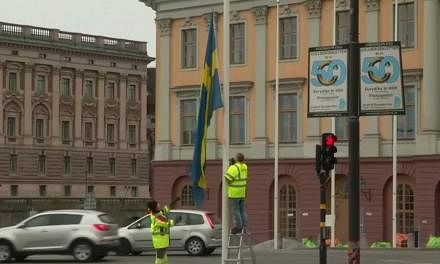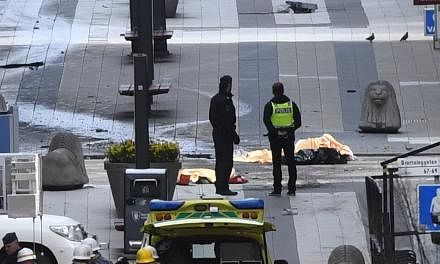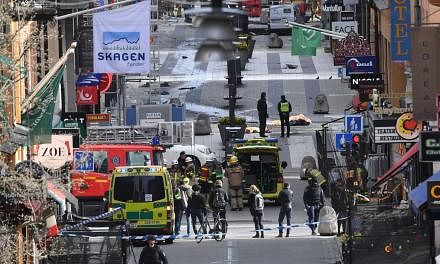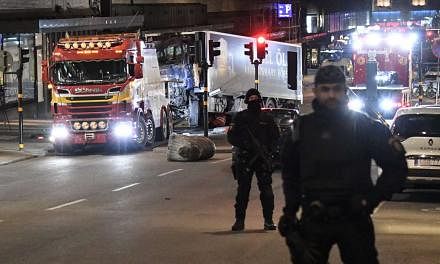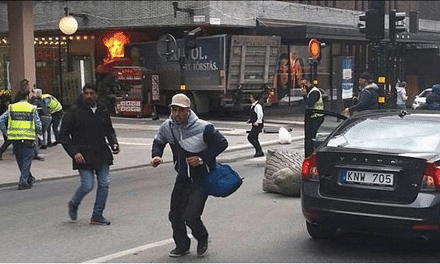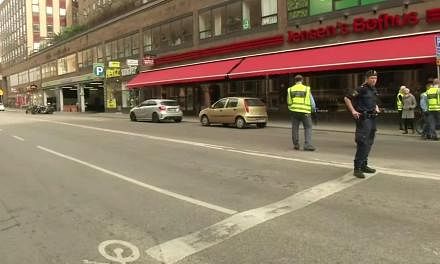STOCKHOLM (AFP) - The main suspect in the Stockholm truck attack is an Uzbek construction worker and father of four believed to have ISIS sympathies, who went underground to avoid deportation from Sweden, police and reports said.
The media quoted his colleagues as saying he was not "particularly religious" and that he "partied and drank".
Swedish dailies Expressen and Aftonbladet meanwhile named the man as Rakhmat Akilov and published his picture on Sunday (April 9).
Swedish police have only identified the suspect as a 39-year-old Uzbek national. He is accused of barrelling a stolen beer truck down a busy pedestrian street on Friday afternoon, mowing down shoppers before smashing into the facade of the Ahlens department store.
Four people were killed - two Swedes including an 11-year-old girl, a British man and a Belgian woman - and 15 others were injured.
The suspect was arrested on Friday evening in Marsta, a suburb around 40km north of Stockholm.
ESCAPE TO MARSTA
According to sources close to the investigation cited by various media, the suspect, bloodied from the crash and with shattered glass on his clothes, fled the scene and ran into the nearby subway station, taking advantage of the panic to blend into the crowd.
At 2.55pm (8.55pm Singapore time), video surveillance cameras caught him in the subway system. He took an express train to Stockholm's Arlanda airport, leaving a bloody trail all the way from central Stockholm, reports said.
He then travelled by bus from the airport to Marsta. His odd behaviour at a petrol station convenience store raised sales clerks' attention, who alerted police.
Police arrested the man at the wheel of a white van, various media reported, and placed him under arrest on suspicion of a "terrorist crime (by committing) murder".
Expressen reported on Sunday that he had allegedly confessed to the crime, telling investigators he was "pleased with what he had done" and had "accomplished what he set out to do".
GONE UNDERGROUND
Investigators have meanwhile remained relatively tight-lipped about the suspect.
According to police, he applied for a permanent residency permit in 2014 but was rejected in 2016.
"In December 2016, he was informed by the Migration Agency that he had four weeks to leave the country. In February 2017, the case was handed over to the police to carry out the order, since the person had gone underground," senior police official Jonas Hysing said.
The suspect had been wanted by police since Feb 27 after failing to respond to a deportation order.
Police said he was known to have "shown sympathies for extremist organisations" such as the Islamic State in Iraq and Syria (ISIS).
According to Swedish daily Aftonbladet, Akilov had posted ISIS propaganda films on his Facebook account and "liked" an image of people covered in blood taken seconds after the Boston marathon bombings on April 15, 2013.
Expressen said several of his Facebook contacts were linked to the Islamist group Hizb ut-Tahrir.
On Sunday, police said they had found components in a bag in the truck that could be used to make a "dangerous device".
PARTIED AND DRANK
According to reports, police at the weekend raided an apartment which Akilov had been renting for a couple of months in Varberg, a working-class suburb of Stockholm.
A father of four children, he lived alone in Sweden and worked in construction, while his family remained in Uzbekistan.
"He came (to Sweden) to work so he could send money to his family," a female acquaintance, whose name was not disclosed, told Aftonbladet.
Another woman who lived at an address where Akilov was also registered told Aftonbladet that he didn't come across as radicalised.
"He never talked about politics or religion," she said. "He didn't pray five times a day from what I know."
Pierre Svensson, who said he employed the suspect through a contractor for several weeks on an asbestos removal project in Stockholm late last year, described him as a "reserved person".
"He didn't stick out. He did his job. You can't say he was very sociable, we just told him what to do and he did it. He didn't speak much Swedish," he told AFP.
After losing his job at the beginning of the year, he had spent his days "smoking and sleeping", according to a former colleague.

